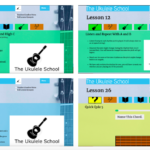The Ukulele School The Ukulele School Join Us Free Sample...
Read MoreWe all know that ukuleles are great for classroom music lessons and the popularity of the ukulele is certainly at something of a high amongst young people at the moment. However, a teacher recently pointed me to this article in The Guardian from 2018 highlighting some of the threats that classical instrumentalists may be feeling, particularly that stalwart of the primary music classroom: the recorder. Arguments about snobbery aside, here are some reasons we feel ukuleles should be welcomed and encouraged rather than feared:
The Ukulele can be a classical instrument too…
The Guardian article suggests that the reason young people are turning to the ukulele is the ability to play rock and pop tunes. Whilst this is undoubtedly true and a great reason to play ukulele, the ukulele is also capable of playing all sorts of music including classical, folk and jazz. Just because it can play Ed Sheeran covers doesn’t mean that’s all it can do. From my own experience of classical training the best way to really get under the skin of a piece of music is to play it, having seen a whole class of pupils strumming along to the Mozart Horn Concerto was certainly more inspiring than just playing it to them.
Classical instruments don’t just have to play classical music…
Of course we want our students to appreciate as much music as possible, but if your problem is that your students would rather play pop covers then where is the harm in it? A song that they know and love is likely to see a lot more practice than one they’ve never heard of. As their ability and confidence grows then you have the opportunity to start introducing them to whatever great music you can think of.
The Ukulele is a transferable skill…
One of the recorders main selling points is it’s a gateway to other woodwind instruments. Whilst some musicians do remain, most recorder players move off to a wide variety of other instruments. I would guess most see the ukulele as a small guitar and therefore only see it leading in one direction. As we explain here the ukulele is an immensely versatile instrument in its own right. For an orchestra to be worried about people playing string instruments (especially ones with four strings) just seems a bit odd. Once a student has learned to pick melodies on a ukulele, they have already learned some of the integral skills involved in violin, viola, cello and double bass.
The Ukulele is both harmonic and melodic…
Here at The Ukulele School we are huge believers in unleashing the full potential of the ukulele. Watching players like James Hill, Jake Shimabukuro or Tamaine Gardener, the first thing you notice is that they are both strumming chords and playing melodies. Unlike single line melodic instruments this means that students can slowly be introduced to more of the underlying theory that helps them to see how music really works. They can compose, improvise and perform and, with a bit of practice, include harmonic lines, counter-melodies and show an awareness of the underlying chord structure. All this as well as being able to just strum along and sing when they want.
So there we have it: why we think the classical world should be embracing the ukulele. Yes it may mean a few less recorder students but if you can instil a love of music making in your students you’ll quickly find that they are keen to try playing all sorts of different instruments.
More from The Ukulele School
5 Things to Consider When Buying a Class Set of Ukuleles.
The Ukulele School The Ukulele School Join Us Free Sample...
Read More


